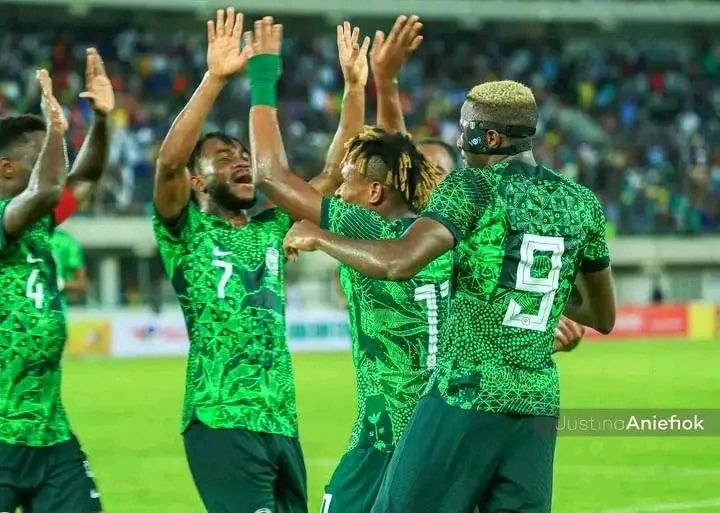The Nigerian Football Federation (NFF) has announced major changes to the technical crews of both the Super Eagles and Super Falcons. Augustine Eguavoen has been confirmed to lead the Super Eagles, while Justin Madugu takes interim charge of the Super Falcons following Randy Waldrum’s departure. These decisions come at a crucial time as both teams prepare for upcoming continental championships.
As the sun set on Lagos’ bustling streets, the NFF’s headquarters buzzed with activity. Inside, officials were putting the final touches on a decision that would reshape Nigerian football. Augustine Eguavoen, a name synonymous with Nigerian football, was officially announced as the head of the Super Eagles’ technical crew.
“Eguavoen’s appointment is not just about his tactical acumen,” said Amaju Pinnick, NFF President, in an exclusive interview. It’s about bringing stability and a deep understanding of Nigerian football to the national team setup.
1. Augustine Eguavoen – Head Coach
2. Fidelis Ilechukwu
3. Daniel Ogunmodede
4. Olatunji Baruwa
5. Tomaz Zorec
This diverse group brings a wealth of local and international experience to the table, potentially ushering in a new era for Nigerian football.
In an unprecedented move, the NFF has tasked Eguavoen and his team with overseeing both the Super Eagles A team and the B team. This dual responsibility underscores the federation’s commitment to developing a cohesive football philosophy across all levels.
“We’re not just preparing for the next tournament,” Eguavoen stated, his voice filled with determination. We’re building a sustainable football culture for Nigeria.”
The B team, often overlooked, will now receive top-level guidance as they prepare for the African Nations Championship (CHAN) qualifiers. This tournament, exclusive to players in domestic leagues, is seen as a crucial platform for developing local talent.
As news of the Super Eagles’ reshuffle spread, another significant announcement followed. The Super Falcons, Nigeria’s decorated women’s national team, would see a change in leadership following Randy Waldrum’s departure.
Justin Madugu, a respected figure in women’s football, has been appointed as the interim head coach. This decision comes at a critical juncture, with the Women’s Africa Cup of Nations (WAFCON) looming on the horizon.
“Madugu’s appointment ensures continuity,” explained Aisha Falode, head of the NFF Women’s Football Committee. “His familiarity with the team and the Nigerian football ecosystem makes him the ideal candidate to guide us through this transition period.”
As both national teams enter new phases, the challenges ahead are significant. For the Super Eagles, the immediate focus will be on the CHAN qualifiers, a tournament that has eluded Nigeria in recent years.
We’re aware of the expectations,” said Fidelis Ilechukwu, one of the newly appointed assistant coaches. “But we’re also excited about the opportunity to showcase the talent in our domestic league on the continental stage.”
Meanwhile, the Super Falcons face the daunting task of preparing for the WAFCON without a permanent head coach. The tournament, scheduled for next summer in Morocco, will be a true test of the team’s resilience and adaptability.
As news of the reshuffles spread, Nigerian football fans took to social media to express their thoughts. The reaction was mixed, with many expressing hope for a new era, while others remained skeptical.
“Eguavoen has been here before,” tweeted @NaijaFootballFan. I hope this time he can bring the glory days back to Nigerian football.
Others, like Lagos-based football journalist Adebayo Ogunjobi, urged caution. “While these changes are exciting, we need to give both technical crews time to implement their vision. Instant success is rarely sustainable in football.”
As the dust settles on these significant appointments, all eyes turn to the future. The NFF’s decision to entrust both national teams to experienced local coaches signals a shift in strategy, potentially paving the way for more homegrown talent in coaching roles.
For the Super Eagles, the immediate challenge will be to navigate the CHAN qualifiers successfully. This tournament, often overshadowed by its more prestigious counterparts, could serve as a launching pad for domestic players looking to make their mark on the international stage.
The Super Falcons, on the other hand, face a race against time. With the WAFCON approaching, Madugu and his team must quickly establish a playing style and identity that can compete with the continent’s best.
As Nigeria’s football community digests these changes, one thing is clear: the coming months will be crucial in shaping the future of Nigerian football. Whether these appointments will lead to success on the pitch remains to be seen, but they undoubtedly represent a bold new direction for the country’s national teams.
The reshuffling of Nigeria’s national football teams’ technical crews marks a significant moment in the country’s sporting history. With experienced local coaches at the helm, both the Super Eagles and Super Falcons are poised for new chapters. As they prepare for their respective continental challenges, the eyes of the nation – and indeed the football world – will be watching closely. The success or failure of these appointments could well define Nigerian football for years to come.




